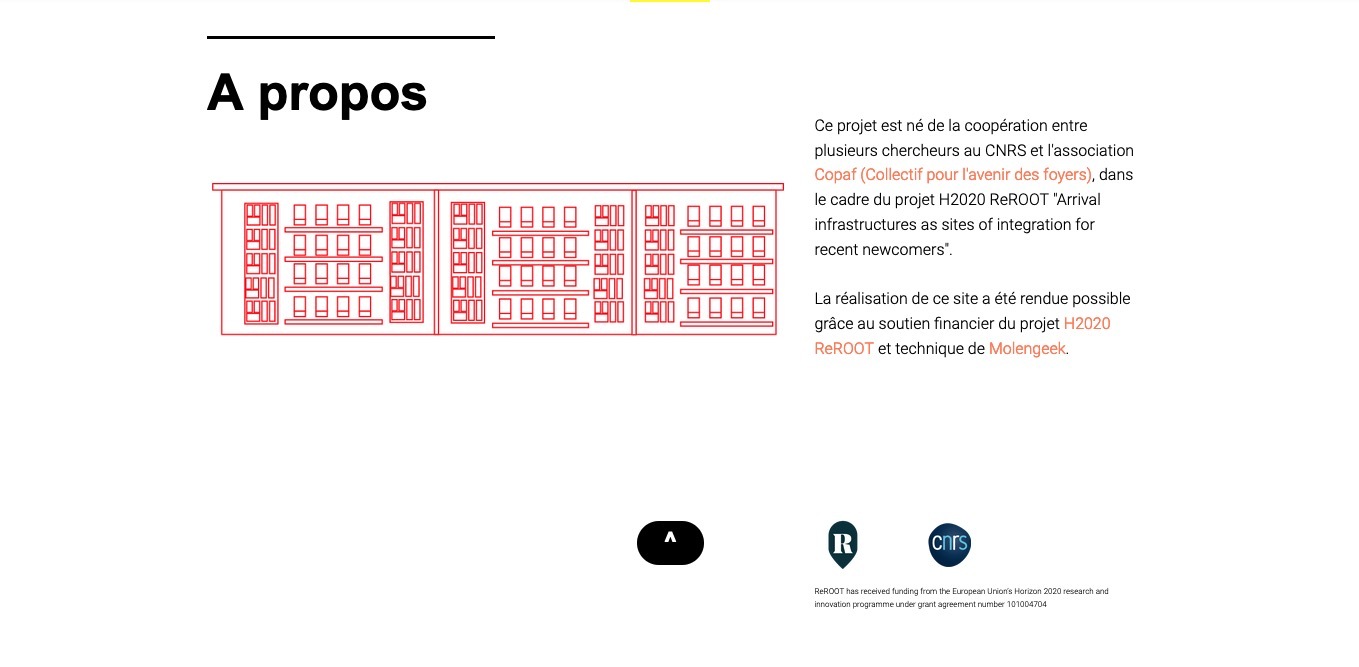Paris
text by Laura Guérin (CNRS)
Edited by Cornelia Tippel (ILS)
Edited by Cornelia Tippel (ILS)
During the summer of 2022, 118 inhabitants of the Boulogne foyer received a judgement announcing their soon eviction, due to a rent debt contracted with their previous managing structure. Even if this debt was bought by the current managing structure in 2018 for 1€. The evictions remain underway, and inhabitants and militants have difficulties to reach local supports because of the foyer’s ‘bad reputation’ in the neighbourhood. We want to create virtual and physical spaces to highlight the current situation and to include it to the larger context of the transformations of foyers and the institutional evictions. While working with militants, some foyers’ neighbours and sociologists (working on evictions), we will organize a colloquium in the National Assembly on the 1st of June, one public discussion about institutional evictions next to the foyer in Boulogne and create a website that will host all information necessary to understand the Boulogne case and its history.
Description of the platform building

The first element is a website, where we presented a history of the Boulogne foyer. Through a timeline, from the 1960s to the present day, we contextualized the history of the foyer and its political tension in the context of the global transformation of housing and migration policies.
The second platform was hosted at the Assemblée Nationale through a colloquium entitled ‘Vie privée, vie collective, cadre de représentation : le droit des résidents des logements-foyers en question’ dedicated to legal propositions and a public debate on housing and living conditions for migrants (around foyers and social residency). This event took place on the 1st of June and was organized by the Paris site and the Copaf. The event was organized around three round tables, following a small introduction:
The three round tables were concluded by a debate on the juridical proposal needed to improve the inhabitant’s everyday life, according to inhabitants and militants, and the role of social mobilization in the foyer current transformations. The entire debate is accessible on the Andrée Taurinya YouTube page: https://www.youtube.com/@AndreeTaurinya42/videos.
The third event was hosted in Boulogne but outside the foyer (to gather new people from the one present in October). It was a public discussion on institutional evictions around the recent publication of Camille François, De gré ou de force. Comment l’État expulse les pauvres. (2023). At first, we wanted to organize this event in a public library near the foyer, but we received a negative response from the library manager (the ‘bad reputation’ of the foyer in Boulogne is maybe one of the explanations). We then decided to host it in a café near the foyer (less than 200 metres), called BB Rose. It took place on the 26th of June.
The second platform was hosted at the Assemblée Nationale through a colloquium entitled ‘Vie privée, vie collective, cadre de représentation : le droit des résidents des logements-foyers en question’ dedicated to legal propositions and a public debate on housing and living conditions for migrants (around foyers and social residency). This event took place on the 1st of June and was organized by the Paris site and the Copaf. The event was organized around three round tables, following a small introduction:
- 14h30 – Le mélange des populations précarisées en « logements-foyers » : la spécificité des travailleurs isolés ; (precarious population diversity in ‘housing-foyer’: the single workers’ specificity).
- 15h45 – Le comité de résidents : une instance de représentation à renforcer ; (inhabitants’ representatives: fight for representation)
- 17h15 – Pourquoi et comment appuyer l’intégration des résidents dans la ville et la société ? (Why and how helping inhabitants’ integration in the city and society?)
The three round tables were concluded by a debate on the juridical proposal needed to improve the inhabitant’s everyday life, according to inhabitants and militants, and the role of social mobilization in the foyer current transformations. The entire debate is accessible on the Andrée Taurinya YouTube page: https://www.youtube.com/@AndreeTaurinya42/videos.
The third event was hosted in Boulogne but outside the foyer (to gather new people from the one present in October). It was a public discussion on institutional evictions around the recent publication of Camille François, De gré ou de force. Comment l’État expulse les pauvres. (2023). At first, we wanted to organize this event in a public library near the foyer, but we received a negative response from the library manager (the ‘bad reputation’ of the foyer in Boulogne is maybe one of the explanations). We then decided to host it in a café near the foyer (less than 200 metres), called BB Rose. It took place on the 26th of June.
Target groups
For the website, the target audience is mainly journalists and scholars but also neighbours. This online platform aims to increase the visibility on the foyer history and contemporary struggles.
For the second event, hosted at the Assemblée Nationale, the target groups are policy-makers, French elected representatives, journalists and local associative actors that were invited to come. The debates were not only focusing on the Boulogne case as we wanted to highlight the national context.
The third event, organized in a Boulogne café near the foyer, wanted to attract neighbours as they were our main target group. But even though we distributed more than 200 flyers in the neighbourhood, none of them came. The effective audience was composed of scholars, militants and inhabitants.
For the website, the target audience is mainly journalists and scholars but also neighbours. This online platform aims to increase the visibility on the foyer history and contemporary struggles.
For the second event, hosted at the Assemblée Nationale, the target groups are policy-makers, French elected representatives, journalists and local associative actors that were invited to come. The debates were not only focusing on the Boulogne case as we wanted to highlight the national context.
The third event, organized in a Boulogne café near the foyer, wanted to attract neighbours as they were our main target group. But even though we distributed more than 200 flyers in the neighbourhood, none of them came. The effective audience was composed of scholars, militants and inhabitants.
Lessons Learned and Open Questions

- Distinct Roles: During platform-building, researchers often juggle multiple roles. It’s essential to recognize when you’re speaking from an individual perspective (‘I’ researcher) versus representing collective ideas (‘we’ actors).
- Navigating Shifts: Be mindful of shifts in writing style and content. Clarify whether you’re sharing personal experiences or conveying broader viewpoints. Balancing these roles ensures clarity and coherence.
- Scientific Stance: As a sociologist, maintaining a scientific position is crucial. Endorsing this discourse during academic discussions helps align your work with your professional identity.
- Representing Inhabitants: In platform building, it’s crucial to ensure that inhabitants are well-represented. Electing délégués (inhabitants) played a significant role in facilitating collective discussions and organizing processes, especially during the colloquium.
- Multiplicity of Actors: To foster co-creation, all relevant actors—délégués, militants, policy-makers, scholars, and a retired foyer manager—were included in meetings and round tables. This multiplicity of perspectives enriched the platform-building process.
- Challenges of Inclusivity: Balancing inclusivity with administrative constraints is complex. While efforts were made to represent all foyer inhabitants, practical limitations arose. Undocumented migrants, crucial voices in the context, couldn’t be invited due to entry requirements at the Assemblée Nationale. Despite these challenges, inviting a former undocumented migrant provided valuable insights, even though a current undocumented migrant’s perspective would have been ideal. Transcribing experiences without granting a platform remains a dilemma.



